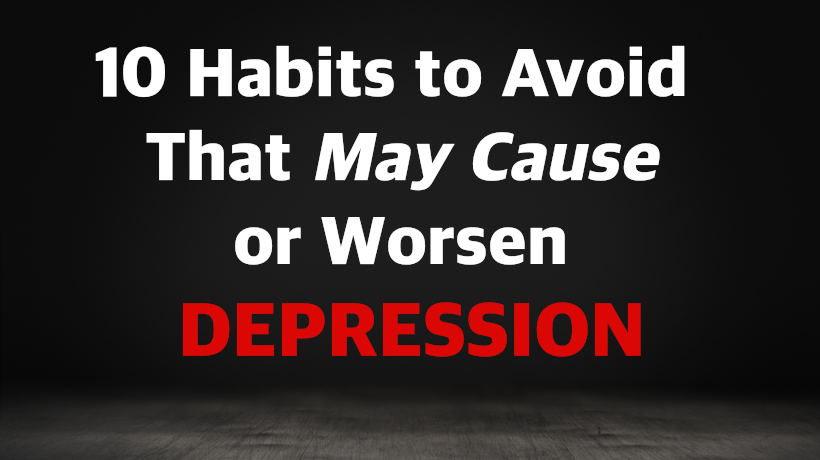Low self-esteem can creep into our lives in a number of ways. We either know someone who has low self-esteem or we are the ones that have it. Little habits that we do every day have the power to lower our confidence levels in a pretty significant way, according to Carolyn Steber, a sex and relationships writer at Bustle. Although clinical depression is more than just being down or sad, but a medical disorder that can be brought on by a number of factors, there are still actions we can take in our everyday life to help us improve our mental well-being.
Below are 10 common habits we do that may lower our self-esteem and cause depression.
Not Setting Clear Boundaries
If you are a people pleaser, it’s often hard to think about yourself. You put others’ needs before your own. While this may seem like a genuinely good habit to adopt (especially when you are always “there” for the other person), it can leave you feeling emotionally exhausted. If you want people to respect your time and space, you first have to respect them yourself.
Susan Rose, a happiness and success coach, says, “Every time you allow someone to hijack your time (like pulling you off a priority project to do something for them, canceling on you at the last minute, or being an hour late), you lose a bit of your self-worth.” Rose goes on to say that when you say yes to others, you are disrespecting yourself.
She notes that when we are young, we are taught to be nice and saying no may feel like someone might not love us anymore. However, she declares, “letting people ignore your boundaries hurts you.” It’s time to show up for yourself. Say no and be more aware of your time and energy.
Being Overly Self-critical
Let’s face it. Everyone makes mistakes. Your inner self monologue (or the way you talk about yourself, to yourself) has an impact on how you may be able to love yourself.
Rose says, “Every time you say things like ‘you idiot, you forgot,’ or ‘I’m such a flake,’ or ‘you can’t do anything right’ you lower your self-esteem. Words matter, and constantly criticizing yourself for simply being human erodes self-esteem.”
Give yourself a break and understand that you are human. Be aware of all the negative words and phrases you use on yourself and try to stop them before they get too harsh. An easier way to do this is to replace your negative self-talk with something more positive or even challenge the negative self-talk when it arises.
Hanging Out with Toxic Friends
If you have low self-esteem, you may want to take a look at your company. Who are you hanging around with on a daily basis?
Dr. Perpetua Neo, an executive coach and psychologist, says, “If most of your friends and coworkers are toxic, it will begin to affect your self-esteem.” Are they bringing down your self-esteem? Is it incredibly exhausting just hanging out with them? It may be time to let that person go.
Sometimes, it can be hard to let a person go, especially if we have a lot of memories with them, but the sooner you do it, the better. Neo says, “Detox your social scene, [and] you’ll have tons more energy and time for yourself, your dreams, and great people.”
Not Taking Enough Risks
Taking risks may do wonders for self-esteem. Sometimes, it can even be incredibly empowering. If you have low self-esteem, it may seem like a good idea to avoid calculated risks because of the idea of failure. Unfortunately, by not taking risks, you may miss out on what was destined for you.
Remember the famous adage by George Addair? “Everything you’ve ever wanted is sitting on the other side of fear.
While it is important that you do not put yourself in immediate danger like attacking a hungry grizzly, taking calculated risks regarding your career may be the way to go. Erin Foley, PhD., career coach states that deep confidence comes from knowing you can handle failing.”
Not Speaking Your Mind
No one likes a person who constantly interrupts and simply blurts out whatever is on their mind. These people can be unpredictable. But knowing that you can use your perspective and voice to generate ideas and empower others is a great confidence tool.
Relationship and life coach Lauren V.T. Irish says, “Holding others accountable when they interrupt and talk over a speaker restores empowerment and builds the confidence of the original speaker.” In 2020, it’s important to use your voice for good. Don’t be afraid to say, “I’m talking.” Follow the footsteps of Kamala Harris and let your ideas fly!
Comparing Yourself to Others
In the golden age of Instagram, Snapchat, and TikTok, it can be rather easy for us to compare ourselves to our peers, influencers, or even celebrities. However, comparing yourself is the best way to kill your self-esteem. Even Deborah Carr Ph.D. reminds others that it is rather toxic behavior to compare yourself to others. Carr lists a few other reasons as to why comparison is bad for your health (mental and emotional): Others’ so-called “perfection” is an illusion, we are all born with different advantages, and comparisons turn friends and allies into rivals.
Psychotherapist and life coach Jasmin Terrany, LMHC, reiterates this concept as well.
To combat this, Celeste Viciere LMHC, a cognitive-behavioral therapist, says, “It’s important that we stay in tune with what we are thinking as we are exploring social media to ensure we are not unconsciously measuring our life against the lives of others.”
Criticizing Others
While criticizing yourself is bad, criticizing others is just as bad. It’s fine to give the occasional critique if someone asks for it, but judging others will make you feel bad as well.
Psychotherapist and life coach Jasmin Terrany, LMHC, says, “Whether you are saying it out loud or thinking it to yourself, either way, you are sitting with negativity, which in essence makes you feel bad.” Spread positivity and try to judge less. We are all human and we all have flaws.
People Pleasing
As stated in the first habit of “Not Setting Clear Boundaries,” people-pleasing may lead you down a path of low self-esteem and possibly depression. Being a good friend or the “good girl” is great, but if you are constantly looking out for others and being there for others, it can reinforce the thinking you are not good enough or worthy enough to look after your own needs and wants. Who is going to be there for you when you need to feel empowered?
Heidi McBain, MA, LMFT, LPC, RPT, professional counselor, says when you put yourself on the back burner, you make other people feel really good and supported, “while you end up with lower self-esteem and feeling less empowered.”
Caring About Other People’s Opinions
Similar to people-pleasing, caring about other people’s opinions of you and what you do can seriously lower your self-esteem. It can leave you feeling exhausted because you are spending all of that extra energy on worrying about what others might think of you. You are essentially living in other people’s heads. As life-freedom coach Amy Matthews, founder of Woman UnRuled, asserts, “It’s your life and no one knows better than you what’s right for you.”
Over Apologizing
Over apologizing is a “side effect” of people-pleasing. According to Sharon Martin, LCSW, when you are a people-pleaser, “You want to be considered nice and polite. You’re overly concerned with what other people think and don’t want to upset or disappoint others.” In turn, she also notes that you may also have low self-esteem and have impossibly high standards for yourself.
“While a sincere apology is a healthy and healing thing when it’s called for, consistently putting yourself in the position of apologizing can wear away at your self-image and make you think of yourself as ‘less than.’” says, Psychotherapist Brennan C. Mallonee, LMHC
While this is a bad habit, you can kick this to the curb. Martin suggests Notice what you’re thinking, feeling, and saying, Question whether an apology is necessary, and Rephrasing your sentence so it does not come out as an apology.
If you are concerned that you or someone you know may have depression, it is advised to consult a medical professional for support.
Sources:



